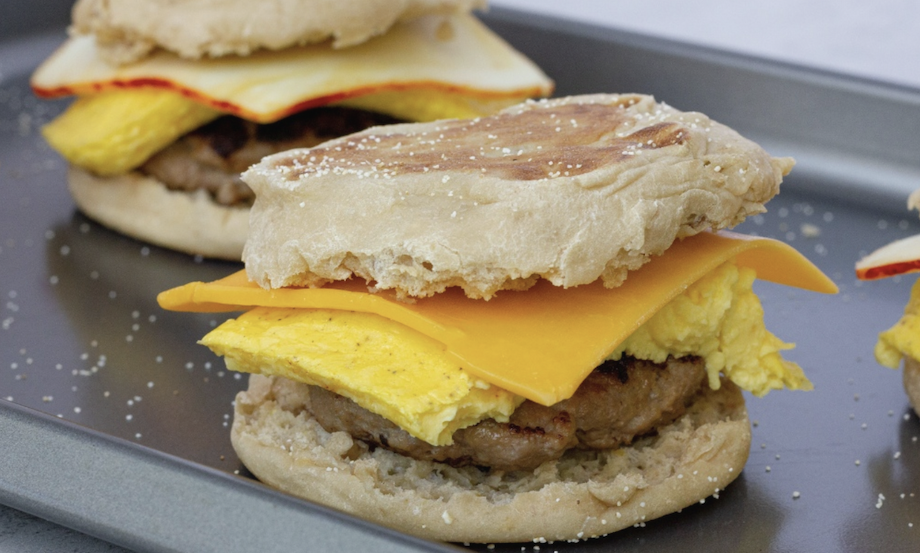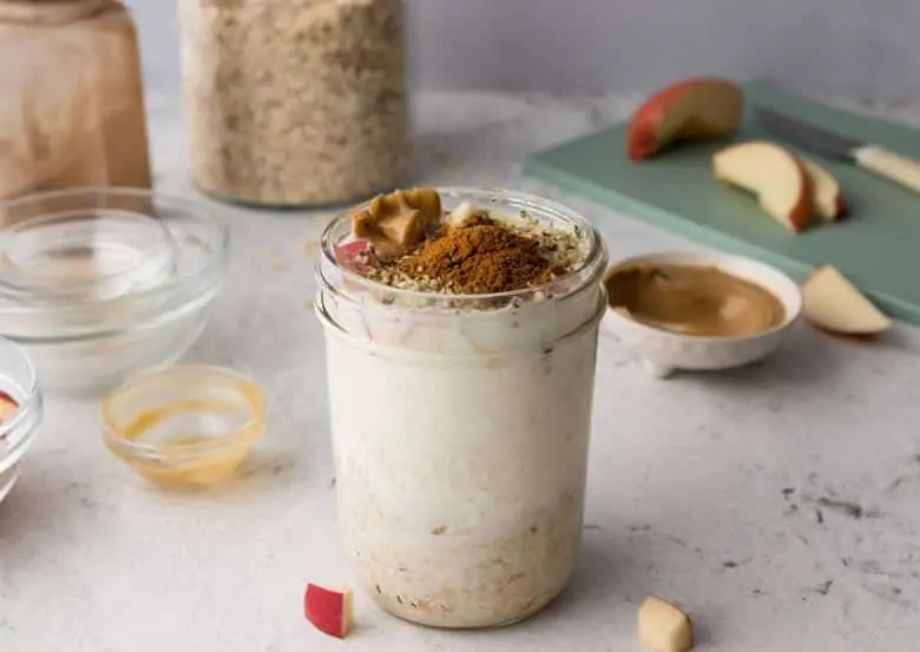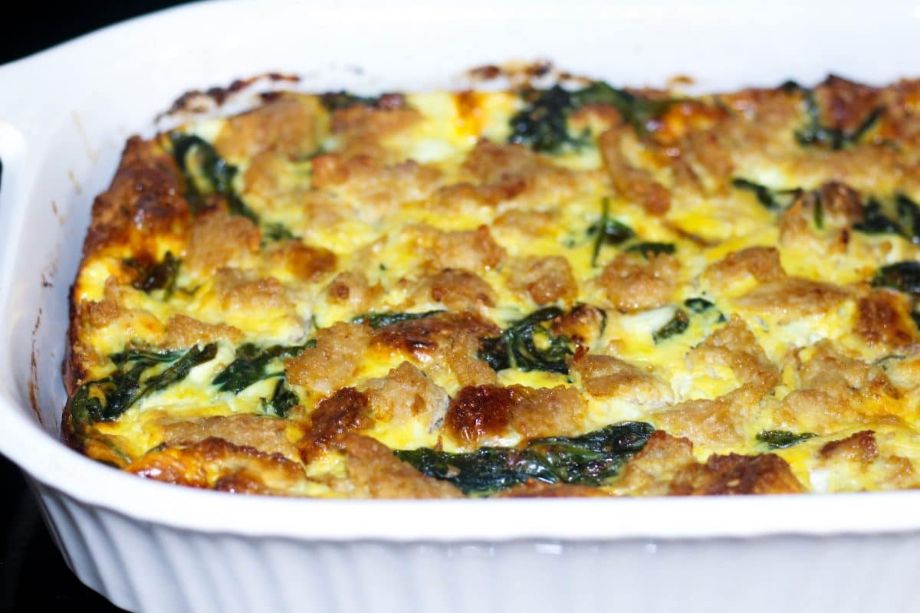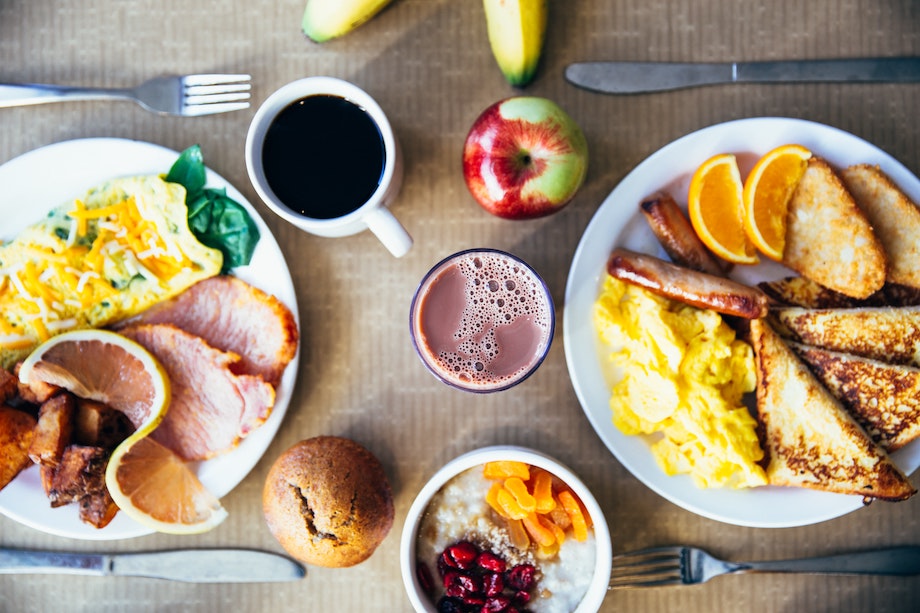We test and review fitness products based on an independent, multi-point methodology. If you use our links to purchase something, we may earn a commission. Read our disclosures.
All too often breakfast is skipped and replaced with a cup of coffee. Prioritizing a high-protein breakfast, even during a busy morning, will help you power through your workout and avoid overeating so you can stay on track with your health goals.
Protein is one of three macronutrients that create complete and balanced meals. Traditional breakfast foods tend to be carbohydrate-heavy. While pancakes, waffles, cream cheese on bagels, or avocado toast can be part of a nutritious breakfast, pairing these foods with a protein-rich food source benefits the body in many ways.
Blood sugar, metabolism, energy levels, and muscle tissue are all strongly impacted by protein intake. Keep reading to learn about the benefits of protein, particularly a high-protein breakfast, how much protein to eat, and satisfying high-protein breakfast recipes you’ll want to try right away!
Medical disclaimer: This article is intended for educational and informational purposes only. It is not intended as a substitute for medical advice. For health advice, contact a licensed healthcare provider.
Why Protein is Important at Breakfast
Whether early morning or brunch-time, your first meal of the day should have a hefty portion of protein for a few reasons.
1. Regulates Blood Sugar
When you eat breakfast1, carbohydrate foods contribute to a post-meal increase in blood sugar. Pairing carbohydrates with high-protein foods helps to slow and reduce elevations in blood sugar,, which is better for maintaining optimal blood sugar control throughout the day.
Protein slows gastric emptying rates, the time it takes for food to exit your stomach and enter your intestines where most nutrient absorption takes place. This likely contributes to a more gradual increase in blood sugar after a high-protein morning meal.
2. Increases Satiety
Protein is more filling than both carbohydrates and fat. Protein takes longer to digest2 and slows down the absorption of food. This improves satiety and makes you feel fuller for longer. Filling up with protein in the morning could help you control hunger and avoid overeating later in the day.
Additionally, eating protein triggers the body to release hormones such as glucagon-like peptide-1 and cholecystokinin, which signal feelings of fullness to the brain.
3. Boosts Metabolism
Protein increases the thermic effect of food3 (TEF), the amount of energy your body uses to digest, absorb, and metabolize nutrients. Filling up your plate with protein for breakfast may slightly rev up your metabolism, helping you burn more calories.
Protein has a higher TEF than fat and carbohydrates. This means your body works harder and requires more calories to break down and metabolize protein. Research shows that protein increases TEF up to 20-30%, compared to only 0-3% for fat and 5-10% for carbohydrates3.
5. Builds Muscle
Protein isn’t just important after a workout! Eating a protein-packed breakfast is necessary to repair muscles, improve strength, and build lean mass.
If you want to build muscle mass, it’s recommended to eat between 1.4 to 2.0 grams of protein per kilogram of body weight4. A registered dietitian can help you determine your personalized protein needs. Including protein with every meal will help you reach your daily protein intake goals.
Muscle protein synthesis is believed to remain elevated for 24 to 72 hours after a strength training workout4. Eating protein every 3 to 4 hours after a workout has been shown to sustain increased muscle protein synthesis for greater gains.
How Much Protein Should I Eat at Breakfast?
The amount of protein you should eat for breakfast varies depending on size, gender, age, and activity level. However, a fair amount of evidence suggests that 20 to 40 grams of protein per meal is ideal for building muscle mass4.
To put this into perspective, two eggs only provide around 12 grams of protein. Eating a variety of high-protein foods for breakfast will help you eat plenty of protein overall.
High-Protein Breakfast Staples
- Eggs are considered nutrient powerhouses for their protein, vitamin, and mineral content. One large egg contains about 6 grams of protein. Eggs are good sources of choline, zinc, and vitamin B12.
- Greek yogurt is higher in protein than regular yogurt and a good source of calcium, vitamin A, and vitamin B12. A 7-ounce container includes about 19 grams of protein.
- Milk is known for its calcium and vitamin D content that supports strong bones. Dairy milk is also a good source of protein and contains about 8 grams of protein per cup.
RELATED: Best Vitamin D Supplements
(Almond milk is lower in fat and calories than dairy milk, but it is also much lower in protein. Soy milk is the plant-based alternative most similar in nutrient content to dairy milk. Soy milk contains 8 grams of protein per cup.)
- Peanut butter is packed with protein, fat, folate, magnesium, and vitamin E. Two tablespoons of peanut butter include 7 grams of protein.
- Turkey bacon is lower in saturated fat than pork bacon, but is still high in sodium and nitrates and should be eaten in moderation. Two slices of turkey bacon include 4.8 grams of protein.
- Ham is generally low in calories but very high in sodium and should be consumed in moderation, especially if you are monitoring your heart health. Three ounces of cured ham contains 14 grams of protein.
- Cottage cheese is a low-calorie, high-protein cheese with a mild flavor that can be used in many recipes. It’s packed with nutrients like B vitamins, calcium, phosphorus, and selenium. There are 15 grams of protein in .5 cup of cottage cheese.
5 High-Protein Breakfast Recipes
It’s easy to get stuck in a rut eating the same old protein smoothie, breakfast bowl, or hard-boiled eggs every morning. Check out the following dietitian approved high-protein breakfast ideas to change up your breakfast routine.
Meal Prep Breakfast Sandwiches

Avoid the drive-through by making your own breakfast sandwiches at home. Meal prep these high-protein breakfast sandwiches for a savory and filling breakfast option that will last several days.
Breakfast sandwiches are extremely customizable and can be made with a variety of your favorite ingredients. This recipe uses turkey breakfast sausage, but you could use ham or Canadian bacon if that’s your preference.
Calories per serving: 295 kcal
Protein per serving: 24 g
French Toast with Greek Yogurt and Apples

This plant-based high-protein french toast is made with healthier ingredients than traditional french toast. Instead of syrup filled with added sugar, this recipe uses Greek yogurt, which adds creaminess, flavor, and protein to satisfy your cravings. (You could even sub in ricotta!)
Made with whole wheat bread instead of white bread, it’s a good source of fiber and other nutrients. Consider other antioxidant-rich toppings like blueberries or raspberries. This recipe can easily be made vegan by tweaking a couple of ingredients.
Calories per serving: 370 kcal
Protein per serving: 21 g
High-Protein Overnight Oats

Recipe by Sarah Schlichter, MPH, RD, CSSD
Overnight oats are made the night before, so you wake to a fiber-rich breakfast. These high-protein overnight oats last in the refrigerator for up to four days, so you can make several servings at once. Topping choices are endless. Consider a granola-and-berries combo for added crunch and sweetness.
These overnight oats are also packed with protein because they’re made with cottage cheese, hemp seeds, peanut butter, and milk. While this recipe uses whole-food protein sources, you could add extra protein to overnight oats using organic protein powder.
Calories per serving: 683 kcal
Protein per serving: 33 g
Healthy Breakfast Sausage Casserole

Recipe by Kelli Shallal, MPH, RD
This recipe uses chicken breakfast sausage, which is typically lower in saturated fat than pork sausage. The sausage and Greek yogurt give this dish a protein boost that will keep you feeling full until lunch.
Unlike many breakfast casseroles, this one includes whole-grain bread full of fiber. Like protein, fiber is also known to promote satiety. This healthy breakfast sausage casserole makes 8 servings, so you’re sure to have leftovers.
Calories per serving: 295 kcal
Protein per serving: 25 g
Denver Omelette Breakfast Burritos

These omelette breakfast burritos can be kept in the freezer and reheated quickly on rushed mornings. The recipe makes 10 burritos, so you’ll have enough for the entire week.
Ham steak is included for added protein and flavor. These veggie-filled burritos are full of colorful bell peppers, sweet onions, and crispy tater tots and wrapped in a chewy tortilla. Add black beans for even more protein or use sweet potatoes instead of tater tots.
Calories per serving: 410 kcal
Protein per serving: 20 g
High-Protein Breakfast: Final Thoughts
Eating a high-protein breakfast is important for staying on track with your health goals. Protein helps your body manage blood sugar, improve metabolism, build muscle mass, and feel full and satisfied between meals. Combining high-protein foods for breakfast will help you reach your protein intake goals.
- Don’t skip breakfast! Your body needs energy in the mornings to power through the day.
- Aim to eat 20 to 40 grams of protein at breakfast.
- Combine high-protein breakfast foods like eggs, Greek yogurt, peanut butter, milk, and turkey bacon.
- Choose easy breakfast recipes that can be prepped and cooked ahead of time to save you time during busy mornings.
High-Protein Breakfast: Q&A
What is a good high-protein breakfast?
A good high-protein breakfast includes between 20 to 40 grams of protein and other nutrients like fiber and healthy fats. For example, high-protein overnight oats could have protein from milk, peanut butter, cottage cheese, and hemp seeds. Oats are whole grains and a good source of fiber. Peanut butter or nut butter is also a healthy source of unsaturated fat.
Consider a high-protein parfait, breakfast tacos, quiche, frittata, or even a tofu scramble. These options are extremely versatile and can be made with a variety of ingredients.
What is a high-protein breakfast to lose belly fat?
Eating a high-protein breakfast may slightly boost your metabolism and keep you feeling fuller between meals, which could help with weight loss. Opt for protein options low in saturated fat, like turkey sausage and low-fat or skim milk, to avoid consuming excess calories.
Try a meal prep breakfast sandwiches or healthy breakfast sausage casserole for a satisfying breakfast that may keep you from overeating later in the day.
What is a good breakfast protein besides eggs?
There are plenty of high-protein breakfast options other than scrambled eggs. Other whole-food high-protein options include cottage cheese, Greek yogurt, walnuts, milk, peanut butter, hemp seeds, chia seeds, turkey or chicken sausage, turkey bacon, ham, and even tofu.
You could also include protein powder in overnight oats, a protein shake, or to make protein pancakes. The best protein powder for you can help you meet your protein intake goals.
What are five high-protein foods?
Cottage cheese, Greek yogurt, milk, ham, and eggs are high-protein foods you can include in a balanced breakfast. Quinoa, black beans, tofu, and smoked salmon are high-protein foods less commonly included in breakfast. Find recipes that combine high-protein foods to increase your overall protein intake.
These statements have not been evaluated by the Food and Drug Administration. This product is not intended to diagnose, treat, cure, or prevent any diseases.
References
- Huicui M., Nirupa R.M., Lynne M.A., Alice H.L. Effect of prior meal macronutrient composition on postprandial glycemic responses and glycemic index and glycemic load value determinations. The American Journal of Clinical Nutrition, 2017;106(5):1246–1256. doi:10.3945/ajcn.117.162727
- Paddon-Jones D., Westman E., Mattes RD., Wolfe RR., Astrup A., Westerterp-Plantenga M. Protein, weight management, and satiety. Am J Clin Nutr. 2008;87(5):1558S-1561S. doi:10.1093/ajcn/87.5.1558S
- Ravn AM., Gregersen NT., Christensen R., et al. Thermic effect of a meal and appetite in adults: an individual participant data meta-analysis of meal-test trials. Food Nutr Res. 2013; 57. doi:10.3402/fnr.v57i0.19676
- Jäger, R., Kerksick, CM., Campbell, BI., et al. National Society of Sports Nutrition Position Stand: protein and exercise.J Int Soc Sports Nutr. 2017;14:20. doi:10.1186/s12970-017-0177-8
Further reading

Adding the GHR exercise to your routine will bulletproof your hamstrings and add muscle to your glutes. Read more

Push workouts are designed to build muscle in the chest, shoulders, and triceps. A CPT lists the 11 best push day exercises, and how to do them step-by-step. Read more

Read on for our full ProForm Trainer 9.0 Treadmill review, so you can make an informed decision if you encounter one for sale. Read more

The Fitbit Ionic is one of the best activity tracking smart watches available on the market today. With Fitbit's encouragement to accomplish fitness goals, an exercise tracker to understand just how fit you are, and multiple day battery life, the Fitbit Ionic should not go overlooked when looking for an activity tracking smart watch. Read more

